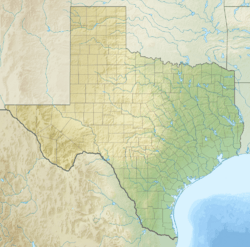Fort Elliott facts for kids
Quick facts for kids
Fort Elliott
|
|
|---|---|
|
Ghost Town
|
|

Texas historical marker for Fort Elliott
|
|
| Country | United States |
| State | Texas |
| County | Wheeler |
| U.S. Army Fort | June 5, 1875 |
| Elevation | 2,661 ft (811 m) |
| Time zone | UTC-6 (Central (CST)) |
| • Summer (DST) | UTC-5 (MDT) |
Fort Elliott was a United States Army post in the Texas Panhandle, operational between 1875 and 1890 and named for Major Joel H. Elliott, a casualty of the Battle of Washita River in 1868.
The decision to establish Fort Elliott in what was to become Wheeler County, Texas, was made in December 1874 by Colonel Nelson A. Miles as an advance supply post during the campaign to clear the Texas Panhandle of American Indians after the Second Battle of Adobe Walls in 1874. Major James Biddle established a temporary post on 3 February 1875 with four troops of the 6th US Cavalry and four companies of the 5th Infantry and the permanent location of the fort on 5 June 1875, twenty-seven miles west of Indian Territory near the headwaters of Sweetwater Creek. African-American troops, familiarly called "Buffalo soldiers," served in this area. In subsequent years, the fort was garrisoned to protect the borders of the Panhandle with Indian Territory, and the cattle drives from Texas to Kansas. The town of Mobeetie in Wheeler County, where Timothy Dwight Hobart and Temple Lea Houston were early settlers, grew beside it.
Among the troops serving there were Lieutenant Henry O. Flipper, the first black graduate of West Point Military Academy, Captain Emerson H. Liscum and Lieutenant Frederick Dent Grant.
Fort Elliott had a dual purpose: first to quiet the Indians on the reservation while the slaughter of the bison continued, and second to encourage Anglo-Americans to settle beyond the 100th meridian. As soon as the fort was established, the cattle industry expanded throughout northwest Texas. Ranches were established on the open range between 1876, with the JA Ranch, and 1886, with the fencing of the XIT Ranch. Fort Elliott was situated on a high elevation of Sweetwater Creek, with the open end of the horseshoe-shaped fort facing the southwest.



